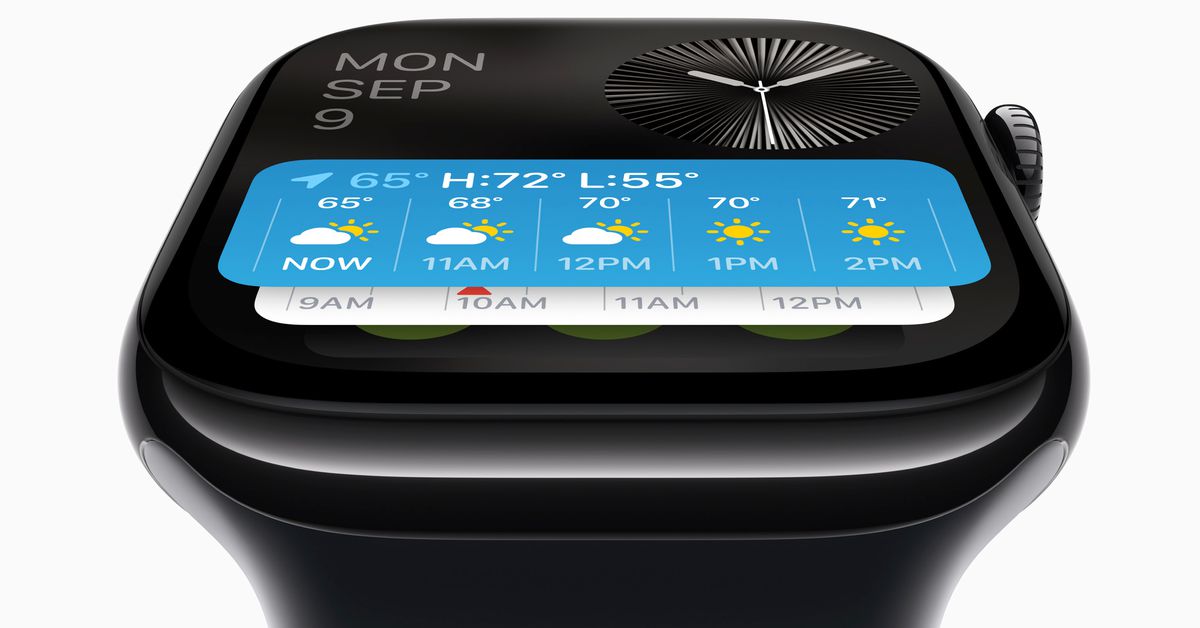The 10th version of the Apple Watch was announced at Apple’s event on Monday and features a 40 percent brighter wide-angle OLED screen that’s larger than the display on the Apple Watch Ultra.
The new Apple Watch Series 10 is just 9.7 millimeters thick, making it 10 percent thinner and 10 percent lighter than the Apple Watch Series 9. Apple says its larger OLED screen, the largest used in an Apple Watch to date, allows the wearable to display an extra line of text onscreen, making it easier for users to check emails and messages at a glance.
Although the Series 10’s case will be available in two slightly larger sizes: 42 and 46 millimeters, it will still be compatible with strap accessories designed for the Series 9 and older. New straps designed for the Series 10 will also be backward-compatible with older models.
Powered by Apple’s new S10 SiP (System in Package) with a four-core neural engine, the Series 10 features a polished aluminum finish and a new metal back integrating the smartwatch’s various antennas. It’s still water-resistant to depths of 50 meters and includes a larger charging coil, enabling faster charges. The Series 10’s battery can be charged to 80 percent capacity in just 30 minutes, while its battery life is estimated to be 18 hours.
The Series 10 will be the first Apple Watch to feature sleep apnea detection (pending FDA approval), using the smartwatch’s accelerometer to monitor a user’s breathing when regularly worn during sleep. Sleep apnea is a condition that causes people to suddenly stop breathing while they sleep and is typically detected using equipment that monitors a patient’s heart, breathing patterns, brain activity, and even limb movements. If the Series 10 detects signs of sleep apnea, it will alert the user and provide a detailed report that can be shared with a doctor, who can make an official diagnosis.
The speakers in the Series 10 are smaller to help improve the smartwatch’s battery life, but Apple says the change doesn’t affect its sound performance. For the first time, the speakers on the Series 10 can also be used to play audio, including music and podcasts, rather than being limited for use only as a speakerphone for calls.
Using a built-in temperature sensor and depth sensor, the Series 10 will provide snorkelers and divers with information about how deep they are. And as part of watchOS 11, the new smartwatch will also include Apple’s Tides app and improved paddling tracking for kayakers.
The Apple Watch Series 10 will be available in several colors and finishes, including a new polished aluminum jet black option, and a natural, gold, and slate titanium version that’s 20 percent lighter than the Series 9. It can be preordered today and will be available on September 20th starting at $399 for a GPS-only version or $499 for a version with cellular capabilities. The titanium version starts at $699.
The Apple Watch Series 10 will also ship with watchOS 11, which adds several new fitness-focused features, including a Vitals app, a Training Load measurement to let you know if you’re above or below your usual activity and training levels, and the option to pause your Activity Rings, so taking a rest day won’t end a long streak.
The 10th Apple Watch arrives after almost a decade of iterative updates for the company’s smartwatch. Apple initially focused on marketing it as a fashion accessory and iPhone companion, but the Apple Watch has since become a vital health and fitness tool through hardware upgrades and new features added to watchOS.
The Series 10 follows last year’s Apple Watch Series 9, which introduced features like a “double tap” gesture allowing calls to be answered single-handedly, a brighter screen, and a new S9 SiP, offering faster on-device processing for Siri requests.
Before that, the Apple Watch Series 8 added temperature sensors for improved health tracking as well as Crash Detection and debuted alongside the Apple Watch Ultra, featuring a larger screen, extra buttons, and a more rugged and durable design to help it compete with products focused on outdoor activities from companies like Garmin and Suunto.

